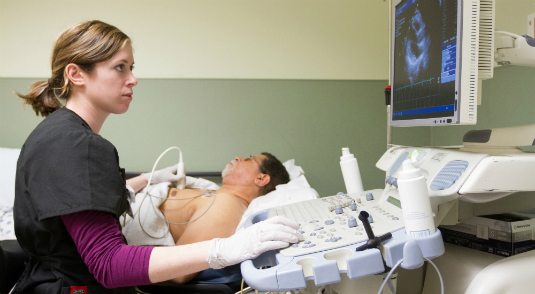Heart Transplant

Heart transplant uses a healthy heart from a recently deceased donor to replace a damaged or diseased heart.
When medical treatments for heart failure are no longer effective, a heart transplant or other therapies, like a ventricular assist device, are options.
Heart failure results when the heart can't pump enough blood throughout the body. Causes include coronary artery disease, damaged heart valves or muscles, congenital heart disease or viral infections.
If you have end-stage heart failure that doesn't respond to medication or other treatments, including maximal medical therapy, we will consider you for heart transplant evaluation.
You may also be a candidate if you have:
- Increasing medication requirements
- Frequent hospitalizations
- Generally declining health and quality of life
Keeping You Safe During COVID-19
Our team takes every precaution to keep you and your loved ones safe during your transplant process. Some steps we're taking include:
- Scheduling telemedicine appointments instead of in-person whenever possible
- Maintaining a COVID-free floor for our transplant patients
- Testing all recipients 48-72 hours prior to surgery, then quarantining until surgery
If you have any questions about our COVID-19 protocols, we encourage you to ask. You may also learn more about our approach to COVID-19 in this video.
Our Experts
Heart transplant specialists at the University of Maryland Heart and Vascular Center perform the most intricate operations to treat even the most complex conditions. Your transplant team includes cardiologists and surgeons who work with a team of experienced specialists in:
- Anesthesiology
- Infectious disease
- Nephrology (kidney disorders)
- Nutrition
- Physical therapy
- Psychiatry
- Social services
Who is a Candidate
Criteria for heart transplant include:
- Inoperable coronary artery disease with congestive heart failure
- Cardiomyopathy (weakening of the heart muscle)
- Inoperable heart valve disease with congestive heart failure
- Severe congenital heart disease with no other surgical options
- Life-threatening abnormal heart rhythms that do not respond to other therapy
- Less than one-year estimated life expectancy without transplant
- Evidence of advanced physical incapacity from documented, isolated heart disease
- A care team that recommends transplant
- Strong family support to help you emotionally before and after heart transplant
Evaluation Before Heart Transplant

You'll meet your transplant nurse coordinator, who schedules appointments and helps gather your health records during the evaluation process. This includes:
- A thorough physical examination
- Reviewing your medical records
- Making sure your other organs are strong enough for surgery
- Discussing your insurance, finances and your care after surgery
- Explaining what happens after transplant, including the medications you will need to take
When you are accepted for transplant, your nurse coordinator will put you on the waiting list for a heart donor. Depending on your condition, we may implant a vascular assist device (VAD), which helps your heart pump effectively until your transplant.
Your coordinator will call as soon as a heart is available. Although this can happen any time, day or night, be prepared to go UMMC immediately for your transplant surgery.
After Your Surgery
After your heart transplant surgery, you will stay in our cardiac intensive care unit until you're ready to be transferred to a step-down unit. To make sure your body accepts your new heart, you will have regular tests that include echocardiograms, electrocardiograms and biopsies.
Life After Heart Transplant
You will meet with your nurse coordinator and a transplant physician once a week for the first four to six weeks after your transplant. To ensure your body doesn't reject your new heart, you will take immunosuppression medications for the rest of your life.
We will perform periodic blood tests to make sure your medications are working properly. You may also meet with social workers and dietitians who can answer any questions you have.
Complications after heart transplant include:
- Bone loss
- Coronary artery disease
- High cholesterol or triglycerides
- Diabetes
- Pulmonary hypertension (high blood pressure)
- Skin cancer
You will stay in contact with your transplant nurse coordinator throughout your life. Whenever you have questions or concerns, you can always call your nurse coordinator.
You will also join a large group of transplant survivors. If you wish to be an active part of this community, you can attend our heart and lung transplant support group meetings.
Telehealth
The UM Transplant team is still seeing patients with urgent or emergent conditions. For all non-urgent medical concerns, virtual appointments are now available. We strongly encourage patients to schedule video and/or phone consults for appointments. Please contact us at 410-328-5408 to find out if telehealth is available for your next visit.
